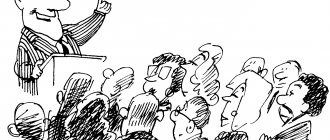In any area of a person’s life, established rules must be followed. This allows for productive dialogue and promotes more positive communication. For business representatives, it is especially important to follow the rules of business communication etiquette. The success of negotiations, conditions satisfying both parties and the possibility of further cooperation depend on correct behavior.
The rules of business etiquette and norms of business communication are not as difficult to learn as many people think. There are no complex standards in this area. Everything is balanced and understandable for business people.
Body language and gestures - typical mistakes
Psychologists say that when communicating, we transmit most of the information using non-verbal means (researchers give different numbers - from 60 to 90%): gestures, facial expressions, intonation and timbre of voice, posture.
The interpretation of some typical gestures is quite firmly established. For example, the fig leaf pose (palms clasped together so that the arms form an inverted "V") indicates shyness and lack of self-confidence. If you make fussy movements, sway from side to side, or touch your face or hair, you increase your own nervous tension and distract others.
Nonverbal communications lie in the plane of both psychology and good manners. For example, when talking to people, you don’t need to spread your legs wide, hunch over, and keep your hands in your pockets. Such poses and gestures are unsightly and make an unpleasant impression on the interlocutor, calling into question the possibility of positive communication.
Study psychology to understand body language and see subtext in the movements and gestures of the interlocutor. It is believed that arms crossed on the chest are a sign that a person is ready for resistance or is trying to isolate himself from contacts, to close himself off.
People make many of the typical mistakes in nonverbal communication unconsciously, out of habit or from excessive emotionality - therefore, you should pay increased attention to your gestures, facial expressions and intonations:
- Excessive gestures during conversation are not encouraged. Gestures should be restrained - interlocutors may be embarrassed by excessive expression.
- The door behind you should be closed softly. To leave by slamming the door means to show bad manners or aggression.
- Do not turn your back to the person you are talking to or to anyone nearby.
- Don't take a step forward if the other person is taking a step back - by doing so, he may be unconsciously trying to make it clear that you are invading his personal space.
- When talking, do not shrug your shoulders - it may seem to your interlocutor that you doubt his words.
- During the meeting, you should not look at your watch - others may think that you are burdened with communication and are in a hurry to leave.
Correspondence via the Internet
Modern entrepreneurs often communicate through social networks and instant messengers, considering this method convenient and less formal.
But even with such communication, it is necessary to observe the etiquette of a business letter:
- Familiar communication is unacceptable; the interlocutor is addressed by name and patronymic.
- You should not use a lot of emoticons.
- Avoid emphasizing important ideas using large print. Many people perceive this negatively.
- Before communicating, you should study a person’s profile in order to understand what he is interested in, what discussions he participates in, and what he publishes.
Business meeting
Business negotiations are communication between two or more parties, the main goal of which is, at a minimum, to improve relations between the parties, and, at a maximum, to find and jointly make a mutually beneficial, reasonable decision. Today's advances in civilization make it possible to conduct negotiations remotely, but it is difficult to overestimate the importance of live communication: even in our technologically advanced times, fundamental issues are usually resolved during a meeting.
Preparation for negotiations consists of the elaboration of the business protocol accepted among diplomats and businessmen, and the substantive part - the issues that should be discussed.
Both the protocol and content parts should be carefully prepared. Partners should be invited to negotiations at least two weeks in advance so that they can also prepare - this will save time and create conditions for effective communication. As for the composition of the delegation, there must be parity at the negotiations, that is, an equal number of participants on both sides and the correspondence of the positions of representatives on each.
Only those employees whose presence is really necessary are invited to the meeting. The venue for negotiations is proposed by the inviting party, but the invitee has the right to either accept or reject it.
It is not recommended to schedule negotiations in the early morning or late evening.
Punctuality is a mandatory condition of negotiations. Being late will make you doubt your reliability as a partner. But you should not arrive earlier than the appointed time, so as not to put the receiving party in an awkward situation.
The ideal place for a meeting is a meeting room, where nothing distracts the attention of the meeting participants.
Your nonverbal behavior during negotiations should reflect interest in the outcome of the meeting and attention to the issues being discussed, so you cannot:
- yawn or engage in other extraneous activities,
- draw in notes, leave cell phones on,
- play with a pen.
A few words about bad manners
There are norms and rules of business etiquette that are unambiguous for all employees: do not read other people’s letters, speak with restraint and politely, be friendly with colleagues and keep a distance from your superiors. But sometimes at work an exception is made to these rules, for example, when you need to find a document in the desk of another employee who is not there. The general conduct at work and in the office must be dignified, with impeccable manners. You constantly need to monitor your behavior, how you walk, communicate, and sit. Remember that it is indecent to touch your nose, ears, hair or other parts of the body in front of everyone.
What you should never do in the workplace:
- Chewing, picking teeth.
- Chew pens, pencils, papers, or nails.
- Correcting makeup, manicure, and applying lipstick at the workplace are the basic rules of business etiquette for a secretary.
- Yawn without covering your mouth.
- Cross your legs on the table, cross your legs
Daily you need:
- Keep your clothes, hair, and body clean, use deodorant, but not perfume.
- Carry a neat handkerchief.
- Monitor your dental health.
These rules and wishes are indispensable standards of etiquette; they allow you to become not only a good, valuable employee, but also a pleasant person with whom you want to do business. Appearance is the best way to demonstrate respect for other people.
Mobile etiquette
The most important rule of mobile etiquette is dictated by common sense: we have the right to use a cell phone if we do not limit the freedom of other people, do not infringe on their interests and do not violate their privacy.
You need to call a mobile phone for business matters during business hours; on weekdays, this is considered to be the time period from 9:00 to 21:00. mobile phone.
At work, you can only use it to resolve business issues - you shouldn’t let everyone in on your personal affairs. It is also undesirable to talk on the phone.
In public transport, in a restaurant and in other places where strangers will be forced to witness your private conversations. if you receive a call and there are other people around you, leave the room and talk.
Voice mail
If you want to dictate a voice message, speak it clearly, including your personal and department information. The message should be short. Do not include multiple phone numbers and email addresses in your voicemail; one is sufficient.
Speakerphone
Before putting a conversation on speakerphone, ask the other person's permission. Don't answer calls on speakerphone or check voicemail on speakerphone—especially if you work in a large, crowded office rather than a private office. This will distract others.
Rules for organizing the workplace
People in creative professions often justify the mess in their office and desk by the specifics of their work. However, a tidy desk improves productivity and organizes thoughts, and also makes a good impression on others.
The workplace is organized correctly, if there are no papers scattered on the table, there is no dust, a large number of family photographs, souvenirs and other personal items. Papers and folders are neatly folded and strictly placed on the table.
How to seat guests at formal receptions
- The hostess sits down at the table first and invites the guests to take their seats.
- At the table, men alternate with women.
- Spouses or employees of the same company do not sit next to each other.
- The men help the ladies next to them sit down, then sit down themselves.
- The most honorable place at a men's reception is to the right of the owner. If the reception is attended by women, then to the right of the hostess. If the guest of honor is invited with his wife, then the guest sits to the left of the host of the reception, and the guest to the right of the hostess - of course, if the hostess and host are sitting next to each other.
- At the end of the meal, the hostess leaves the table first, giving a signal to the rest of the guests.
Privacy Rule
You must be able to keep company secrets, any transaction, without discussing this topic with your colleagues or your loved ones. Do not read letters intended for other persons; transmit all messages personally, without intermediaries or third parties. If you need to send a fax, call the recipient in advance so that he or she is nearby to receive the document or letter in person. Do not mix your personal life with work; do not talk about problems in life, seek consolation or ask for help from co-workers. In the office, it is important to maintain composure and a good mood, regardless of the bad mood. These rules of business etiquette for civil servants and office workers must be strictly followed.
Business etiquette around the world
The English present instructions for action in the form of a polite request. Nevertheless, it is necessary to do it.
If your business papers are a mess, the Germans will draw the appropriate conclusions. It is strictly forbidden to violate the terms and scope of work specified in the contract. Every single point must be strictly followed.
Business negotiations in France, as a rule, begin no earlier than 11 am. It is better to conduct negotiations in French, since the reverent and even painful attitude of the French towards their language and culture is not a myth at all.
In America, great importance is attached to family and hobbies. That’s why in an American’s office you will always see photographs of his relatives and objects related to his hobbies. But this does not mean that you can talk about personal topics. Personal information (age, physical parameters, marital status, religious and political views) is available only to relatives and friends and is not subject to discussion.
Italians pay great attention to meals, so meetings are often scheduled in a restaurant. By refusing a treat, you risk losing your partners. True, the agreements reached during the feast mean little. Final decisions are made later. Business conversations never start with business issues. It is common to talk about life. Don't just ask questions about family and politics, and don't make disparaging comments about football.
A Confucian rule states that a man and a woman should not touch each other when giving or taking something. Therefore, avoid touching the woman. It is also not customary to open the door for her or give way to her.
Greetings in Japan are accompanied by a polite smile and a bow of at least 15 degrees. A more respectful bow of 45 degrees. When the Japanese greet a very important person, the bow can be a full 90 degrees.
The Japanese can shake hands with foreign partners. But if they bow to you, respond with at least a small bow, folding your palms at face level. Avoid direct eye contact.
Arabs are free with time. Arriving at the agreed time, you may not find your Arab partner, but you will be greeted well and treated to coffee, which will be refilled until you shake your cup as a sign that you don’t want any more. Business decisions are usually made at the highest level and are independent of those negotiating. Therefore, sometimes the decision process drags on for a long time. Patience and the ability to wait will help you do business in the east.
Appearance
According to etiquette standards, it is customary to wear a suit, complemented by shoes and accessories. A sloppy appearance is associated with forgetfulness and fussiness. Accuracy demonstrates organization and the ability to value your own and other people’s time.
Types of dress code
Main types:
- White Tie. A gala reception to which men come in a black tailcoat and white vest. Mandatory accessories are a white scarf and a white bow tie. It is advisable to have white gloves, a pocket watch and a thin cane. Women put on a floor-length dress, style their hair, and do makeup. Accessories include long gloves, a fur cape, jewelry, and a miniature handbag.
- Black Tie. Wedding or reception style clothing. Men come in tuxedos, formal trousers and a black bowtie, which should be tied, not pinned as a badge. On my feet are classic derbies or oxfords, but not patent leather ones. For women, high-heeled shoes and long evening dresses are provided; knee-length cocktail dresses are allowed. Accessories - expensive jewelry.
- Cocktail For men - classic dark suits, a bright bow tie, but you can do without it, long socks several shades darker than the trousers. It is important that the tie does not touch the button on the trousers, the bottom button on the jacket is undone, and the cuffs peek out from under the sleeves by 1-2 cm. For women - cocktail dress, high-heeled shoes.
- Smart and Business Casual. It is allowed for a man to wear a suit with a jumper or turtleneck underneath. A possible option is a jacket and jeans. Women should choose clothes in a classic, elegant style, complementing them with shoes and interesting accessories.
- Costume party. The outfit is chosen taking into account the theme of the evening. It is not necessary to choose a themed costume, just use a few characteristic details.
Basic principles of the dress code:
- Men come to business events in a business suit or a shirt and trousers. Depending on the format of the meeting, you can wear a shirt, jeans and a jacket. Women wear a suit, pencil skirt and blouse. Necklines and minis are prohibited.
- There should be few accessories. Men wear cufflinks and watches. A woman should wear no more than two accessories: earrings and a chain, earrings and a ring, etc.
- Hair is neatly cut or styled. Men style their mustaches and beards.
- Manicure on hands.
- Regardless of the weather, shoes should be clean.
- If you have piercings or tattoos on your body, they should be covered with clothing.
The strictness of the dress code depends on the responsibility of the business meeting.
Gesticulation and facial expressions
Familiarity, the use of inappropriate gestures, and waving of arms can cause the deal to be terminated.
To prevent this from happening, you should remember:
- it is important that the posture is straight and movements are restrained;
- a confident gaze is directed into the eyes of the interlocutor;
- you need to control your emotions and facial expressions;
- Only a handshake is allowed.
Correct movements and facial expressions can be rehearsed in front of a mirror so as not to show fussiness and nervousness when meeting. Professional entrepreneurs must master body language and know the basic components of business etiquette.
Communication with partners
Rules of business communication:
- Show respect for the interlocutor and not be late for the meeting.
- Be able to hear and listen, not interrupt the interlocutor until he finishes speaking.
- Be able to speak and write correctly, without using verbal garbage.
- Form diction without defects.
Brief business etiquette tips
When meeting someone, when you are introduced or you introduce yourself, do not rush to offer your hand. The person you are introduced to must do so first. Remember: according to business etiquette, it is not customary to kiss ladies’ hands at an official meeting (according to the rules of social etiquette, only married women kiss the hand and only indoors).
Business etiquette discourages shaking hands with both hands, as it is intended to convey a closer relationship with people. Moreover, people may perceive such a gesture as an attempt to be condescending or patronizing. However, do not forget about cross-cultural differences - for example, Americans adore this gesture and consider it appropriate in business communications.
If you didn’t find the person there, but want to show him respect, fold the upper right corner of the business card you left.
Today, badges are used all over the world - they can contain information not only about the bearer’s name and position, but also the company logo and even a photograph. It is curious that since their invention (and it is generally accepted that the first badges appeared in England at the end of the 19th century), the appearance of the badges has changed little - only the clasp has been improved, for example, badges on a lanyard - a special lanyard for fastening - have become widespread.
The manifestation of simple human attention on the part of the manager always inspires employees. The boss should notice the successes of the subordinate and encourage him. Let it be simple gratitude, but it must be expressed. Congratulating the team on the holiday, and the employee on his birthday - people really appreciate such gestures.
All employees at work should be addressed as “you”; this disciplines and is a sign of respect. However, now in many companies communication in “you” is taken as a standard - in the American style (in English, as we remember, there is no division into “you” and “you”, there is only a single address you). This has already become the norm. However, if your company does not adhere to such principles, it is not worth introducing the “you” address, demonstrating broad-mindedness and progressiveness: nevertheless, communication on “you” implies close relationships, which are not always appropriate at work.
Traditions of hospitality provide for various signs of attention. You can offer guests a cultural program by providing a car with a driver.
The leader must meet and see off the delegation, and then welcome it to the official reception.
There is an unspoken rule (not categorical, but desirable) - if a guest arrives with his wife, then the host manager comes to the first meeting accompanied by his wife.
A protocol visit usually takes place at the premises of the receiving party. In the lobby, the assistant manager greets guests and then escorts them to the office of the head of the institution. The initiative to leave this reception lies with the guests. The next meeting of the delegations will take place during the negotiations.
In a business environment, the issue of compliments is controversial. It is perfectly acceptable and even desirable to give compliments, but they should not be too enthusiastic or about appearance. In both cases, you are invading the personal space of your interlocutor, and besides, excessive enthusiasm is very similar to banal flattery. The most successful option is to compliment the business qualities of your colleague or partner, noting his high professionalism, punctuality or ease of communication.
For a casual conversation, there are several win-win topics. It is appropriate and even desirable to discuss news from the fields of business, sports, entertainment and travel, in addition, such conversations are the easiest to maintain.
It’s interesting that the ringtone of a mobile phone is another touch of a person’s image. Psychologists say that, for example, people who set classical music to their ringtones are most often far from the musical world (musicians do not listen to masterpieces performed in this way). These are conservatives who love everything to be “like other people” and value a sense of proportion in everything. The more famous the melody, the more conservative the person, according to psychologists.
As a rule, the Friday dress code is still closer to the Business Casual style and does not involve bright colors. Basic colors are traditional business ones: gray, beige, brown. Additional shades of clothing should be restrained, noble, in no case acidic or intensely saturated.
Some experts traditionally do not recommend jeans for wearing in a business environment. However, in a number of organizations, employees wear jeans on Fridays; some companies even call the last day of the week “Denim Fridays.”
If you work five out of seven days a week, then business clothes should make up 70% of your wardrobe. Accordingly, it is worth spending significantly more money on it than on leisure clothing. All over the world, business image is considered an economic category: investing in yourself, in your appearance, in your image brings income - just like investing in your knowledge, skills and abilities. Spend as much as your budget allows on your business wardrobe.
The rule for an evening dress is: the more open it is at the top, the more closed it should be at the bottom - and, accordingly, vice versa. Do not violate this proportion of closedness and openness.
Another rule that relates not to clothing, but to the etiquette of receptions: if the invitation does not indicate that you should come with a companion, you must appear alone.
According to unofficial statistics, about 35% of business relationships begin with shared meals. They expand the circle of contacts, help find an approach to the client, negotiate a contract, and establish mutually beneficial relationships. This is a good reason to find the compromises necessary for cooperation.
You can be late for cocktails and buffets and leave early. But be aware: if your visit is very short, it may come off as disrespectful to your hosts. On the contrary, staying at the reception from beginning to end is a sign of respect. If representatives of the same company come to the event, employees should not arrive later than the manager and leave before him. Unlike the buffet, you cannot be late for lunch and dinner. If this does happen, you need to apologize to the owners.
If you order a Japanese dish at a restaurant (for example, rice, noodles, sushi or sashimi), they may bring you chopsticks. If you know how to use them, great. If you don’t know how or simply don’t want to, it’s okay, you don’t have to do it. Just ask the waiter to bring the usual European cutlery: a fork and a knife - this is completely normal.
In many restaurants, waiters will immediately clarify which utensils you prefer to eat Japanese dishes with: traditional chopsticks or the familiar European ones.
For a well-mannered person, it is an absolute norm that you should not drink to excess at corporate events.
The benefits of knowing the rules of behavior
Modern etiquette is far from the etiquette that was accepted in past centuries. Young people allow themselves to come to a meeting in jeans and a T-shirt, use emoticons in online communication, and pat their interlocutor on the shoulder in a friendly manner. But such behavior is acceptable only in a narrow circle.
If a businessman in this form comes to a meeting with a high-ranking official or a foreign investor who represents the older generation, he risks his reputation.
Knowing the basics of business etiquette, you can make a good impression on colleagues and partners from the first minutes of communication, as well as show other people examples of correct behavior.
Interesting Facts
History knows of cases where too zealous adherence to the rules of etiquette did not lead to anything good.
The French Marshal Bessompierre recalled in his memoirs that the Spanish King Philip III died of carbon monoxide while sitting in a chair by the fireplace. The courtiers were unable to find in time the only grandee who, according to palace etiquette, had the right to move the king’s chair.
In Thailand, tourists are told how a boat with Queen Sunanda on board once capsized. But no one dared to come to her aid. When a high-ranking courtier who had the right to touch the queen arrived, it was too late.
Rules of good manners in communicating with colleagues
When you just start working in the office and get to know your colleagues, you begin to build relationships on which the climate in the team and the results of the overall work will depend. How to behave in order to win them over? Be friendly with everyone, but don't try to get close to just one person right away, give yourself some time to get to know people better. Feel free to ask employees about work, but don’t start personal conversations with them at first. Don’t worry if you didn’t manage to join the team from the first day, there’s nothing wrong with that. Always thank your colleagues for their help and remember not to go beyond the rules of business communication etiquette.
For example:
- do not bother your colleagues with your conversations and do not interfere in other people’s conversations;
- do not gossip and do not listen to gossip, do not eavesdrop on other people's telephone conversations;
- do not discuss health problems and body functions with colleagues;
- do not try to express or impose your personal opinion on any occasion;
- do not reprimand anyone in the presence of strangers, even if you are right three times, if you suddenly lose your temper - apologize immediately;
- do not pretend that you are busier than others, sometimes you can politely ask your colleagues not to make noise, but do it politely and without challenge;
- do not be selfish; in your zeal for office, try not to harm your colleagues in order to earn some advantage or curry favor with your superiors.
And the main rule of business etiquette, both for an office worker and a civil servant, says: “you must be polite, tactful, courteous and tolerant in dealing with colleagues and management, never being led by your emotions.”
Telephone conversations
In serious companies, personal conversations on the office phone are suppressed. During business meetings, you should turn off your mobile phone, or at least set it to vibrate.
If a telephone call is made as part of the performance of official duties, then certain rules must be followed:
- Introduce yourself and name the organization on whose behalf you are calling.
- Find out if it is convenient to talk now. If not, when can I call you back?
- Maintain a polite tone throughout.
- Try to keep the conversation brief, stating the essence.
- Politely say goodbye, thanking you for your time.
- If you make an appointment during a call, you should immediately write down the exact time and place on a prepared piece of paper.
Don't interrupt anyone
The opinion of any employee can be of great importance in the work, and everyone (to the extent of their authority) can express comments in a group discussion. However, one must observe the limits of decency and speak out in accordance with the approved (publicly or privately) regulations.
If there is a need to object or supplement the speech of the person speaking, then, according to professional communication etiquette, you need to wait until the opportunity to speak arises. But you shouldn't interrupt other people.
You need to watch your statements
Anyone can encounter a situation where a colleague or subordinate causes extreme irritation. No matter how intense the situation may be, you need to remain calm and watch your words.
If we talk about profanity or obscene words, this is an absolute taboo from the point of view of professional etiquette. At all times, oral and written communication should be polite and respectful. It is important to control yourself and not allow rudeness, humiliation or disdain towards colleagues, subordinates or business partners in your expressions.
Competent speech is a sign of professionalism and education
Literacy requirements concern not only the ability to speak, but also the correct execution of business letters and other documents. In this case, a formal presentation style is required. The address in the letter may begin with the word “Dear.” Any spelling errors are unacceptable.
Etiquette prescribes conversation in a calm tone in any situation, even if the views of the interlocutors are controversial. Naturally, obscene language is unacceptable. There are topics that are not recommended to be discussed, for example, about religion, politics, illness, personal income, and age for women.











